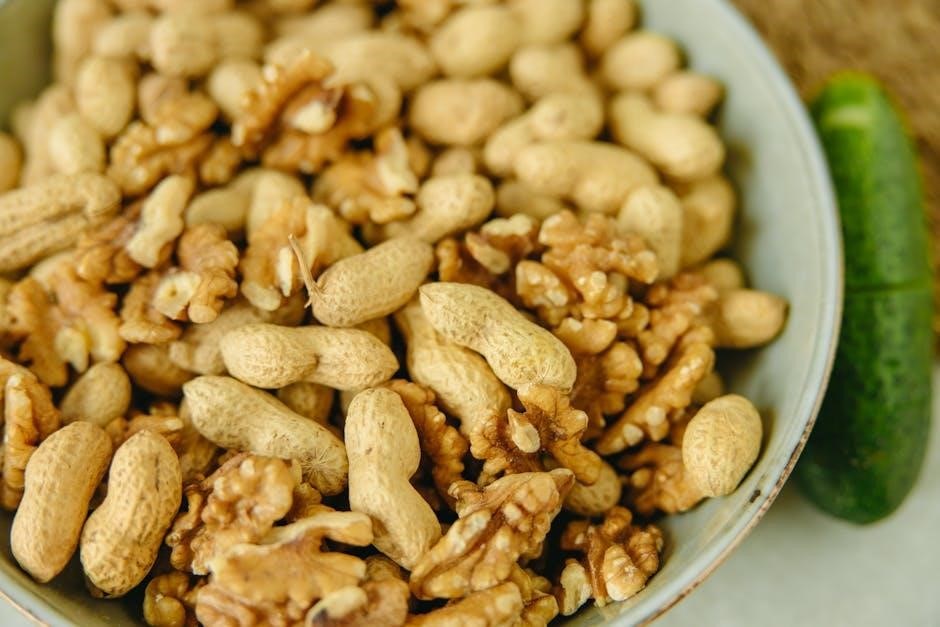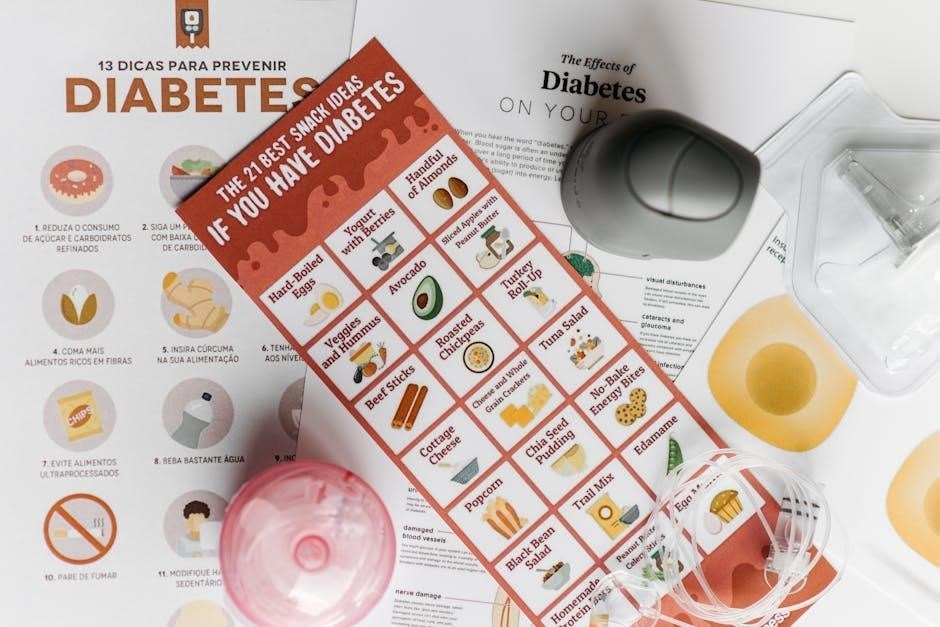Psoriasis is a chronic inflammatory condition that can be managed through dietary adjustments. A well-structured psoriasis diet plan focuses on anti-inflammatory foods‚ antioxidants‚ and healthy fats to reduce symptoms and promote healing. Research suggests that tailored nutrition plays a significant role in alleviating psoriasis severity‚ offering a natural approach to managing the condition alongside medical treatments. Understanding the connection between diet and psoriasis is essential for creating a personalized plan that supports overall skin health and well-being.
1.1 Understanding Psoriasis
Psoriasis is a chronic autoimmune condition characterized by inflamed‚ scaly skin patches. It occurs when the immune system mistakenly attacks healthy skin cells‚ accelerating their growth. Symptoms include thick‚ red plaques with silvery scales‚ often on elbows‚ knees‚ and scalp. While the exact cause is unknown‚ genetics and environmental factors contribute. Psoriasis is not contagious but can significantly impact quality of life. Managing symptoms often involves a combination of medical treatments and lifestyle changes‚ including dietary adjustments‚ to reduce inflammation and promote healing. Understanding its mechanisms helps in tailoring effective management strategies.
1.2 The Role of Diet in Managing Psoriasis
Diet plays a crucial role in managing psoriasis by reducing inflammation and alleviating symptoms. Certain foods can trigger or worsen flare-ups‚ while others may help control the condition. Anti-inflammatory and antioxidant-rich foods are particularly beneficial‚ as they combat oxidative stress and inflammation. Omega-3 fatty acids‚ found in fish and flaxseeds‚ are known to soothe skin and reduce redness. Avoiding triggers like gluten‚ dairy‚ and processed foods can also help mitigate symptoms. While diet alone cannot cure psoriasis‚ it complements medical treatments and supports overall skin health.
1.3 Benefits of a Psoriasis Diet Plan
A psoriasis diet plan offers numerous benefits‚ including reduced inflammation‚ fewer flare-ups‚ and improved skin health. By focusing on nutrient-rich foods‚ individuals can enhance their immune function and overall well-being. A structured diet helps identify and avoid trigger foods‚ leading to better symptom control. Additionally‚ a diet tailored for psoriasis can promote weight management and reduce the risk of comorbidities like heart disease. Incorporating anti-inflammatory and antioxidant-rich foods supports healing and may reduce reliance on medications‚ fostering a holistic approach to managing the condition effectively.

Key Components of a Psoriasis Diet Plan
A psoriasis diet plan emphasizes anti-inflammatory foods‚ omega-3 rich sources‚ antioxidants‚ fiber‚ whole grains‚ healthy fats‚ and essential vitamins and minerals to promote healing and reduce inflammation.
2.1 Anti-Inflammatory Foods
Incorporating anti-inflammatory foods is crucial for managing psoriasis. Leafy greens like spinach and kale‚ berries‚ and fatty fish rich in omega-3s‚ such as salmon‚ help reduce inflammation. Broccoli‚ turmeric‚ and ginger are also potent anti-inflammatory agents. These foods work by targeting inflammation pathways and promoting healing. Including them in your diet can significantly alleviate psoriasis symptoms and improve skin health. A focus on whole‚ unprocessed foods ensures optimal nutrient intake‚ supporting the body’s natural anti-inflammatory responses.
2.2 Omega-3 Rich Foods
Omega-3 fatty acids are essential for reducing inflammation‚ a key factor in psoriasis. Fatty fish like salmon‚ mackerel‚ and sardines are rich in EPA and DHA‚ which help soothe skin inflammation. Plant-based sources like flaxseeds‚ chia seeds‚ and walnuts also provide ALA‚ a precursor to omega-3s. Incorporating these foods into meals or snacks can support skin health and alleviate psoriasis symptoms. While supplements are available‚ whole-food sources are often more effective and easier to integrate into a balanced diet plan.
2.3 Antioxidant-Rich Foods
Antioxidant-rich foods are crucial in managing psoriasis by reducing oxidative stress‚ which can trigger inflammation. Berries‚ leafy greens‚ and other fruits and vegetables are packed with antioxidants like vitamins C and E. These nutrients help neutralize free radicals‚ promoting skin health and reducing inflammation. Incorporating foods like spinach‚ blueberries‚ and bell peppers into your diet can support the healing process and alleviate psoriasis symptoms. A diet rich in antioxidants not only benefits the skin but also overall well-being‚ making it a cornerstone of a psoriasis-friendly meal plan.
2.4 Fiber and Whole Grains
Fiber and whole grains are essential for a psoriasis-friendly diet‚ aiding digestion and reducing inflammation. Whole grains like oats‚ quinoa‚ and brown rice provide sustained energy and fiber‚ which supports gut health. A healthy gut microbiome is linked to reduced inflammation‚ benefiting psoriasis sufferers. Including high-fiber foods like whole grains‚ legumes‚ and vegetables helps regulate blood sugar and promotes a balanced immune response‚ crucial for managing psoriasis symptoms effectively and enhancing overall well-being through dietary choices.
2.5 Healthy Fats
Healthy fats‚ such as avocados‚ nuts‚ seeds‚ and olive oil‚ are crucial in a psoriasis diet plan. They provide essential fatty acids that reduce inflammation and promote skin health. Omega-3 rich fats‚ found in fatty fish like salmon‚ also help alleviate psoriasis symptoms by combating inflammation. Incorporating these fats supports the body’s natural healing processes and contributes to overall well-being‚ making them a vital component of a psoriasis-friendly diet.
2.6 Vitamins and Minerals
Vitamins and minerals play a vital role in managing psoriasis. Vitamin D‚ often referred to as the “sunshine vitamin‚” helps regulate skin cell growth and reduce inflammation. Zinc supports immune function and skin repair‚ while selenium acts as an antioxidant to protect cells from damage. Folate-rich foods‚ such as leafy greens‚ also contribute to overall skin health. Ensuring adequate intake of these nutrients through diet or supplements can significantly impact the management of psoriasis symptoms and improve quality of life for those affected.

Foods to Avoid
Certain foods can trigger inflammation and worsen psoriasis symptoms. Avoid gluten‚ dairy‚ processed foods‚ saturated fats‚ artificial sweeteners‚ and alcohol. These can exacerbate skin inflammation and flare-ups.
3.1 Gluten and Dairy
Gluten and dairy products are common triggers for psoriasis flare-ups due to their potential to cause inflammation. Many people with psoriasis find relief by eliminating these foods from their diet. Gluten‚ found in wheat‚ barley‚ and rye‚ can trigger an autoimmune response in sensitive individuals. Similarly‚ dairy contains proteins like casein‚ which may exacerbate inflammation. Removing these items can help reduce skin irritation and promote healing. Consider alternatives like gluten-free grains and non-dairy milk to maintain a balanced diet without triggering symptoms.
3.2 Processed Foods
Processed foods are often high in unhealthy ingredients like trans fats‚ added sugars‚ and artificial additives‚ which can trigger inflammation and worsen psoriasis symptoms. These foods typically lack essential nutrients and fiber‚ contributing to oxidative stress and skin irritation. Limiting or avoiding processed foods‚ such as packaged snacks‚ sugary beverages‚ and fast food‚ is crucial for managing psoriasis. Opt for whole‚ unprocessed foods like fruits‚ vegetables‚ and whole grains to support skin health and reduce inflammation effectively.
3.3 Saturated Fats
Saturated fats‚ commonly found in red meat and full-fat dairy products‚ can exacerbate inflammation and worsen psoriasis symptoms. These fats are known to promote the production of inflammatory markers in the body. Reducing intake of saturated fats is recommended to help manage psoriasis effectively. Instead‚ consider replacing them with polyunsaturated fats‚ such as omega-3 fatty acids found in fatty fish or flaxseeds‚ which have anti-inflammatory properties. Moderation is key‚ and focusing on healthier fat sources can significantly impact skin health and overall well-being for those with psoriasis.
3.4 Artificial Sweeteners
Artificial sweeteners like aspartame and saccharin can trigger inflammatory responses‚ potentially worsening psoriasis symptoms. These additives are often found in processed foods and beverages‚ making them difficult to avoid. Reducing or eliminating artificial sweeteners from your diet can help minimize inflammation and support skin health. Opt for natural alternatives such as stevia or honey in moderation. Being mindful of food labels and choosing whole‚ unprocessed foods can further reduce exposure to these harmful additives‚ aiding in better psoriasis management and overall well-being.

3.5 Alcohol and Caffeine
Alcohol and caffeine can exacerbate psoriasis symptoms by triggering inflammation and dehydrating the skin. Alcohol‚ in particular‚ can disrupt the body’s natural healing processes and worsen flare-ups. Caffeine‚ while not as harmful‚ should be consumed in moderation to avoid overstimulation‚ which may indirectly affect skin health. Limiting or avoiding these substances can help reduce inflammation and promote healthier skin. Opting for herbal teas or water as alternatives can further support a psoriasis-friendly diet and overall well-being.

Popular Diets for Psoriasis
Popular diets for managing psoriasis include the Mediterranean‚ gluten-free‚ vegetarian‚ and alkaline diets. These plans emphasize anti-inflammatory foods‚ antioxidants‚ and balanced nutrition to reduce symptoms and promote healing. The Mediterranean diet‚ rich in fruits‚ vegetables‚ and healthy fats‚ is particularly recommended for its anti-inflammatory properties. Gluten-free and vegetarian diets help avoid potential triggers and boost antioxidant intake‚ while the alkaline diet focuses on reducing acidity. Each diet offers unique benefits‚ allowing individuals to choose a plan that aligns with their lifestyle and needs.
4.1 Mediterranean Diet
The Mediterranean diet is highly recommended for psoriasis management due to its anti-inflammatory and antioxidant-rich properties. It emphasizes fresh fruits‚ vegetables‚ whole grains‚ and healthy fats like olive oil. Fish‚ particularly those high in omega-3 fatty acids‚ are also central to this diet‚ helping to reduce inflammation. Additionally‚ the Mediterranean diet limits red meat and processed foods‚ which can exacerbate psoriasis symptoms. By incorporating these elements‚ individuals can create a balanced and sustainable eating plan that supports skin health and overall well-being. This diet is often tailored to individual needs for optimal results.
4.2 Gluten-Free Diet
A gluten-free diet is often recommended for managing psoriasis‚ especially for those with gluten sensitivity or celiac disease. Gluten‚ found in wheat‚ barley‚ and rye‚ can trigger inflammation in some individuals‚ worsening psoriasis symptoms. Eliminating gluten from the diet may help reduce skin inflammation and promote healing. Focus on gluten-free alternatives like rice‚ quinoa‚ and gluten-free oats‚ along with fresh vegetables‚ lean proteins‚ and healthy fats. This dietary approach can be tailored to individual needs and is often combined with other anti-inflammatory foods for better results. Always consult a healthcare provider before making significant changes. A balanced gluten-free diet can support overall health and skin well-being. Regular monitoring of symptoms is essential to assess its effectiveness and make necessary adjustments. Over time‚ many patients report improved skin clarity and reduced flare-ups when adhering to a gluten-free plan. Patience and consistency are key to achieving long-term benefits. Additionally‚ incorporating gluten-free whole grains can provide essential nutrients and fiber‚ aiding in digestion and overall wellness. This diet is particularly beneficial for those with coexisting conditions like celiac disease or non-celiac gluten sensitivity. By focusing on nutrient-rich‚ gluten-free options‚ individuals can create a sustainable eating plan that supports their psoriasis management and enhances their quality of life. Many resources‚ including downloadable guides and meal plans‚ are available online to help navigate this dietary approach effectively. With careful planning and adherence‚ a gluten-free diet can be a valuable tool in managing psoriasis and promoting healthier skin. Always seek professional guidance to ensure the diet meets individual nutritional needs and health goals. A well-structured gluten-free diet can make a significant difference in managing psoriasis symptoms and improving overall well-being. By eliminating problematic foods and emphasizing whole‚ nutrient-dense options‚ individuals can take a proactive approach to their health. This dietary strategy is widely recognized for its potential benefits and is often recommended as part of a comprehensive psoriasis management plan. Embracing a gluten-free lifestyle can lead to noticeable improvements in skin health and overall wellness‚ making it a worthwhile consideration for those living with psoriasis. With the right guidance and resources‚ adopting a gluten-free diet can be a positive step toward managing the condition effectively. The key is to stay informed‚ remain consistent‚ and continuously monitor progress to achieve the best possible outcomes. By doing so‚ individuals can enjoy a healthier‚ more balanced life while keeping their psoriasis symptoms under control. The gluten-free diet is not just a temporary solution but a long-term strategy for managing the condition and improving quality of life. It is essential to approach this diet with patience and an open mind‚ as results may vary from person to person. Staying committed to the plan and seeking ongoing support can help individuals achieve their health goals and maintain a positive outlook. A gluten-free diet is a practical and effective way to take control of psoriasis and work toward a healthier future. By making informed choices and staying dedicated‚ individuals can experience the benefits of this dietary approach firsthand. The gluten-free diet offers a promising avenue for managing psoriasis‚ and with the right resources and support‚ it can be a transformative step toward better health and well-being. Always remember to consult with a healthcare professional before making any significant changes to your diet‚ as they can provide personalized advice and ensure the best possible outcomes. A gluten-free diet is a valuable tool in the fight against psoriasis‚ and with proper implementation‚ it can lead to significant improvements in skin health and overall wellness. By embracing this dietary approach‚ individuals can take a proactive role in managing their condition and enjoying a healthier‚ more vibrant life. The gluten-free diet is a testament to the power of nutrition in managing chronic conditions like psoriasis‚ offering hope and relief to those seeking natural and effective solutions. With its focus on whole‚ nutrient-rich foods‚ this diet is not only beneficial for psoriasis but also promotes overall health and well-being. By choosing a gluten-free lifestyle‚ individuals can embark on a journey toward healing and vitality‚ making every meal a step toward a better tomorrow. The gluten-free diet is a simple yet powerful way to manage psoriasis‚ and its benefits extend far beyond the skin‚ impacting overall health and quality of life. By incorporating gluten-free options into daily meals‚ individuals can create a balanced and nutritious eating plan that supports their psoriasis management and enhances their well-being. This dietary approach is a shining example of how nutrition can play a vital role in managing chronic conditions‚ offering a pathway to healing and improved health. With the gluten-free diet‚ individuals can take charge of their psoriasis and work toward a brighter‚ healthier future. The gluten-free diet is a beacon of hope for those seeking natural and effective ways to manage their psoriasis‚ providing a clear and actionable plan for achieving better skin health. By eliminating gluten and focusing on nutrient-dense foods‚ individuals can create a diet that not only manages their condition but also nourishes their entire body. This approach to nutrition is a powerful reminder of the deep connection between diet and health‚ and how making informed choices can lead to significant improvements in overall wellness. The gluten-free diet is a practical and effective strategy for managing psoriasis‚ offering individuals the tools they need to take control of their health and enjoy a higher quality of life. By embracing this dietary approach‚ individuals can experience the transformative power of nutrition and move closer to achieving their health goals. The gluten-free diet is a valuable resource for anyone looking to manage their psoriasis naturally‚ providing a clear and sustainable path toward better health and well-being. By making informed dietary choices‚ individuals can empower themselves to manage their condition effectively and live a healthier‚ more vibrant life. The gluten-free diet is a testament to the impact of nutrition on chronic conditions like psoriasis‚ offering a hopeful and effective solution for those seeking relief. By focusing on whole‚ gluten-free foods‚ individuals can create a diet that supports their overall health while managing their psoriasis symptoms. This dietary approach is a powerful example of how nutrition can be a cornerstone of effective disease management‚ providing individuals with the tools they need to achieve better health outcomes. The gluten-free diet is a shining example of how making informed dietary choices can lead to significant improvements in managing chronic conditions like psoriasis. By eliminating gluten and emphasizing nutrient-rich foods‚ individuals can create a balanced and effective eating plan that supports their health and well-being. This diet is a valuable tool for anyone seeking to manage their psoriasis naturally‚ offering a clear pathway to better skin health and overall wellness. By embracing the gluten-free lifestyle‚ individuals can take a proactive approach to their health‚ making every meal a step toward healing and vitality. The gluten-free diet is a powerful strategy for managing psoriasis‚ demonstrating the profound impact of nutrition on chronic conditions. By focusing on whole‚ gluten-free foods‚ individuals can create a diet that not only manages their psoriasis but also enhances their overall health and quality of life. This dietary approach is a beacon of hope for those seeking natural and effective solutions‚ offering a clear and actionable plan for achieving better health outcomes. By making informed choices and staying committed to their dietary plan‚ individuals can experience the transformative benefits of the gluten-free diet and enjoy a healthier‚ more vibrant life. The gluten-free diet is a testament to the power of nutrition in managing chronic conditions like psoriasis‚ providing individuals with the tools they need to take control of their health and well-being. By eliminating gluten and focusing on nutrient-dense foods‚ individuals can create a balanced and effective eating plan that supports their psoriasis management and enhances their overall wellness. This dietary approach is a shining example of how informed dietary choices can lead to significant improvements in health‚ offering a pathway to healing and vitality for those living with psoriasis. By embracing the gluten-free lifestyle‚ individuals can empower themselves to manage their condition effectively and enjoy a higher quality of life. The gluten-free diet is a valuable resource for anyone seeking to manage their psoriasis naturally‚ providing a clear and sustainable approach to better health and well-being. By making informed dietary choices‚ individuals can experience the transformative power of nutrition and move closer to achieving their health goals. The gluten-free diet is a powerful strategy for managing psoriasis‚ demonstrating the profound impact of nutrition on chronic conditions. By focusing on whole‚ gluten-free foods‚ individuals can create a diet that supports their overall health while managing their psoriasis symptoms. This dietary approach is a beacon of hope for those seeking natural and effective solutions‚ offering a clear and actionable plan for achieving better health outcomes. By staying committed to their dietary plan‚ individuals can experience the benefits of the gluten-free diet and enjoy a healthier‚ more vibrant life. The gluten-free diet is a testament to the impact of nutrition on managing chronic conditions like psoriasis‚ offering individuals the tools they need to take control of their health and well-being. By eliminating gluten and emphasizing nutrient-rich foods‚
4.3 Vegetarian Diet
A vegetarian diet is highly beneficial for managing psoriasis due to its emphasis on anti-inflammatory and antioxidant-rich foods. Plant-based foods like leafy greens‚ berries‚ and cruciferous vegetables (e.g.‚ broccoli) help reduce inflammation and oxidative stress. Whole grains‚ legumes‚ and healthy fats from avocados and olive oil are also key components. Avoiding processed foods and focusing on natural‚ nutrient-dense options can alleviate symptoms and improve skin health. A well-structured vegetarian diet supports overall well-being and is often recommended for its anti-inflammatory properties. Consult a healthcare provider to tailor the plan effectively.
4.4 Alkaline Diet
The alkaline diet focuses on balancing acid and alkaline foods to reduce inflammation‚ which can benefit psoriasis; It recommends an 80% alkaline and 20% acid food ratio‚ emphasizing fruits‚ vegetables‚ and nuts. Foods like citrus fruits‚ leafy greens‚ and alkaline-rich vegetables are encouraged‚ while processed foods and meats are avoided. This diet helps minimize acid buildup‚ potentially easing psoriasis symptoms. Proper hydration with alkaline water is also advised to support detoxification and skin health. A structured alkaline diet plan can complement medical treatments for better symptom management.

Meal Planning and Management
Effective meal planning involves portion control‚ hydration‚ and balanced snacks. Regular meals and mindful eating help manage psoriasis symptoms and support overall health. Plan ahead for better results.
5.1 Portion Control
Portion control is crucial for managing psoriasis through diet. It ensures balanced nutrient intake without overconsumption‚ which can trigger inflammation. Using measuring cups or a food scale helps maintain appropriate serving sizes. Eating smaller‚ frequent meals can also aid digestion and reduce symptom flare-ups. Additionally‚ avoiding large portions of inflammatory foods like processed meats and sugary snacks is essential. By monitoring portion sizes‚ individuals can better regulate their dietary habits and support their overall psoriasis management plan effectively.
5.2 Hydration
Staying hydrated is essential for overall health and psoriasis management. Drinking 8-10 glasses of water daily helps flush toxins and maintain skin health. Herbal teas and fresh vegetable juices can also contribute to hydration; Avoid sugary beverages and caffeine‚ which can dehydrate the body. Proper hydration supports the skin’s natural barrier function‚ reducing dryness and irritation often associated with psoriasis. Incorporating water-rich foods like cucumbers and watermelon can further enhance hydration levels and promote healing from within;
5.3 Snacking Tips
Healthy snacking is crucial for managing psoriasis. Opt for anti-inflammatory options like fresh berries‚ nuts‚ and sliced vegetables. Include omega-3 rich snacks such as flaxseeds or walnuts to reduce inflammation; Avoid processed and sugary snacks‚ as they can trigger flare-ups. Consider apple slices with almond butter or a handful of leafy greens for satisfying‚ nutrient-dense choices. Herbal teas or water with lemon can also serve as refreshing‚ hydrating snacks. Choose snacks that align with your psoriasis diet plan to maintain progress and overall well-being.
5.4 Meal Frequency
Eating smaller‚ balanced meals throughout the day can help manage psoriasis symptoms. Aim for 4-6 meals‚ including 3 main meals and 2-3 snacks‚ to maintain stable energy levels and reduce inflammation. Incorporate a variety of anti-inflammatory foods‚ such as leafy greens‚ berries‚ and omega-3 rich options‚ into each meal. Avoid heavy‚ processed meals that may trigger flare-ups. Staying consistent with meal timing and portion control supports overall dietary balance and skin health. Tailor your meal frequency to suit your lifestyle and nutritional needs for optimal results.

Nutritional Supplements
Nutritional supplements like vitamin D‚ fish oil‚ selenium‚ and zinc can support psoriasis management by reducing inflammation and promoting skin health. Consult a healthcare provider before starting any supplementation.
6.1 Vitamin D
Vitamin D is crucial for immune regulation and skin health‚ making it a key supplement for psoriasis management. Research indicates that vitamin D deficiency is common among psoriasis patients‚ and supplementation can help reduce symptoms. It works by modulating the immune system and promoting healthy skin cell growth. Many psoriasis diet plans recommend consulting a healthcare provider to determine appropriate vitamin D levels and supplementation dosage‚ as it can significantly enhance treatment outcomes and improve quality of life.
6.2 Fish Oil
Fish oil is rich in omega-3 fatty acids‚ particularly EPA and DHA‚ which have potent anti-inflammatory properties. These nutrients are beneficial for reducing inflammation and scaling associated with psoriasis. Studies suggest that incorporating fish oil into a psoriasis diet plan can improve skin health and alleviate symptoms. It is recommended to consult a healthcare provider for the appropriate dosage‚ as fish oil can interact with other medications. Regular consumption may help in managing the condition more effectively alongside other dietary changes.
6.3 Selenium
Selenium is a powerful antioxidant that plays a crucial role in reducing oxidative stress‚ which can exacerbate psoriasis symptoms. It is a key component of enzymes that help combat inflammation and protect cells from damage. Foods rich in selenium‚ such as Brazil nuts‚ tuna‚ and turkey‚ are often recommended in psoriasis diet plans. Supplementing with selenium may help alleviate symptoms‚ but it is important to consult a healthcare provider to determine the appropriate dosage. Balancing selenium intake is essential to avoid toxicity and maximize its benefits for skin health.
6.4 Zinc
Zinc is an essential mineral that supports skin health and immune function‚ making it beneficial for managing psoriasis. It helps reduce inflammation and promotes healing by protecting skin cells from oxidative damage. Foods rich in zinc‚ such as shellfish‚ lean meats‚ nuts‚ seeds‚ and fortified cereals‚ are often recommended in psoriasis diet plans. Zinc supplements can also be effective‚ but it is important to consult a healthcare provider to avoid toxicity and ensure proper dosage. Adequate zinc intake supports overall skin health and may help alleviate psoriasis symptoms.

Lifestyle Modifications
Lifestyle changes play a crucial role in managing psoriasis. Maintaining a healthy weight‚ exercising regularly‚ and reducing stress can significantly improve symptoms. Adequate sleep is essential.
7.1 Weight Management
Weight management is vital for psoriasis patients‚ as excess weight can trigger inflammation. A balanced diet and portion control help maintain a healthy weight‚ reducing disease severity; Regular physical activity and mindful eating are key. Even modest weight loss can improve symptoms significantly. Monitoring weight weekly and avoiding high-calorie‚ processed foods are recommended. A healthy BMI reduces systemic inflammation‚ promoting better skin health and overall well-being. Combining dietary changes with exercise supports sustainable weight management‚ enhancing the effectiveness of a psoriasis diet plan.

7.2 Exercise
Exercise plays a crucial role in managing psoriasis by reducing inflammation and stress‚ which can trigger flare-ups. Activities like walking‚ swimming‚ and yoga are ideal‚ as they promote circulation and relaxation. Regular physical activity helps maintain a healthy weight‚ further alleviating symptoms. Consistency is key‚ as even moderate exercise can improve overall well-being. Avoiding overexertion is important‚ as it can lead to stress‚ potentially worsening psoriasis. Incorporating exercise into your routine complements a psoriasis diet plan‚ enhancing its effectiveness and promoting healthier skin and body function.
7.3 Stress Reduction
Stress is a known trigger for psoriasis flare-ups‚ as it increases inflammation and disrupts the immune system. Effective stress management techniques‚ such as meditation‚ deep breathing exercises‚ and mindfulness‚ can help mitigate these effects. Engaging in hobbies and maintaining a consistent sleep schedule also support emotional well-being. Incorporating relaxation practices into your daily routine can complement your psoriasis diet plan‚ creating a holistic approach to managing symptoms and improving overall health. Reducing stress not only benefits the skin but also enhances mental clarity and resilience.
7.4 Sleep
Adequate sleep is crucial for overall health and can significantly impact psoriasis management. Poor sleep quality or insufficient rest can trigger inflammation and stress‚ worsening symptoms. Establishing a consistent sleep schedule and creating a relaxing bedtime routine helps improve sleep hygiene. Avoiding caffeine and electronic devices before bed can enhance sleep quality. Prioritizing 7-8 hours of restful sleep nightly supports the body’s natural healing processes‚ which is essential for managing psoriasis effectively alongside dietary changes and stress reduction practices.

Monitoring and Adjustments
Regularly track your symptoms and dietary progress to identify what works best for your psoriasis. Adjust your plan based on improvements or setbacks‚ ensuring long-term effectiveness and personalized health benefits.
8.1 Tracking Symptoms
Monitoring your psoriasis symptoms is crucial for evaluating the effectiveness of your diet plan. Keep a journal to document changes in redness‚ scaling‚ and pain levels. Note any flares or improvements after dietary adjustments. Tracking patterns helps identify trigger foods and beneficial nutrients. Regularly assessing your skin’s condition allows for timely modifications to your meal plan‚ ensuring a more personalized and effective approach to managing psoriasis through nutrition. Consistent tracking also provides valuable insights for healthcare providers‚ aiding in comprehensive care strategies.
8.2 Adjusting the Diet Plan
Based on symptom tracking‚ adjustments to the diet plan may be necessary to optimize results. If certain foods trigger flares‚ consider removing them permanently. Increase intake of anti-inflammatory foods like omega-3 rich fish or antioxidants if inflammation persists. Some individuals benefit from shifting to a Mediterranean or alkaline diet for better symptom control. Regularly review and modify portion sizes‚ meal frequency‚ and hydration levels. Consulting a healthcare provider or dietitian can help refine the plan‚ ensuring it aligns with personal needs and promotes long-term relief from psoriasis symptoms.